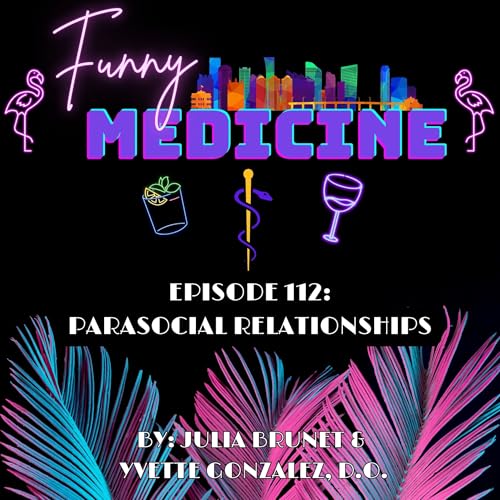
Why You Think Your Favorite YouTuber Is Actually Your Friend | Funny Medicine Ep 112
Failed to add items
Add to basket failed.
Add to Wish List failed.
Remove from Wish List failed.
Follow podcast failed
Unfollow podcast failed
-
Narrated by:
-
By:
About this listen
Ever felt like you "know" a celebrity, streamer, or fictional character? You're not alone. In this episode, we dive into parasocial relationships: the one-sided bonds we form with people who may never know we exist.
We explore where the idea came from in the 1950s with psychologists Donald Horton and Richard Wohl, how it's evolved with social media, and why our brains are wired to feel connected to people on screens.
You'll learn about:
• What parasocial relationships are (and how they differ from being a fan)
• Why we get attached to creators, celebrities, and characters
• The benefits: companionship, inspiration, identity, stigma reduction
• The risks: obsession, isolation, and when things cross the line
• Modern twists: stan culture, influencer marketing, AI companions, VTubers
• Myth-busting common misconceptions It's a funny, honest conversation about something most of us experience without realizing it.
📱 Follow us everywhere
Instagram & Threads: @funnymedicinepodcast
Twitter/X: @FunnyMedPod
TikTok: @funnymedicinepodcast
🔔 Subscribe: https://bit.ly/FunnyMedicineSubscribe
🎧 Listen: https://funnymedicinepod.link
👍 Like & Share if you learned something new
🎙️ New episodes every Tuesday. Hit SUBSCRIBE and ring the bell!
THIS PODCAST IS FOR ENTERTAINMENT PURPOSES ONLY AND DOES NOT SUBSTITUTE FOR PROFESSIONAL MEDICAL ADVICE.
Sources:
Horton & Wohl (1956) - Original parasocial interaction study Harvard Health (2023) - Parasocial relationships and loneliness gaps TIME Magazine (2023) - In defense of parasocial relationships Lamarche et al. (2024) - Parasocial relationships fulfill emotional needs Lam et al. (2022) - YouTube parasocial relationships reduce mental health stigma Zajonc (1968) - Mere exposure effect and familiarity Coyne et al. (2018) - Meta-analysis of prosocial media effects Mares & Pan (2013) - Sesame Street learning across 15 countries Schiappa et al. (2005) - Parasocial contact hypothesis Risks: Cohen (2004) - Parasocial breakups and attachment styles U.S. Surgeon General (2023) - Loneliness epidemic advisory Joseph et al. (2023) - VTubers and social support Maeda et al. (2024) - AI companions public perceptions Hartmann (2008) - Parasocial interaction encyclopedia entry
#FunnyMedicinePodcast parasocial relationships, parasocial interaction, celebrity culture, influencer culture, fandom, stan culture, social media psychology, mental health, loneliness, attachment, YouTube creators, Twitch streamers, TikTok creators, VTuber, AI companion, media effects


